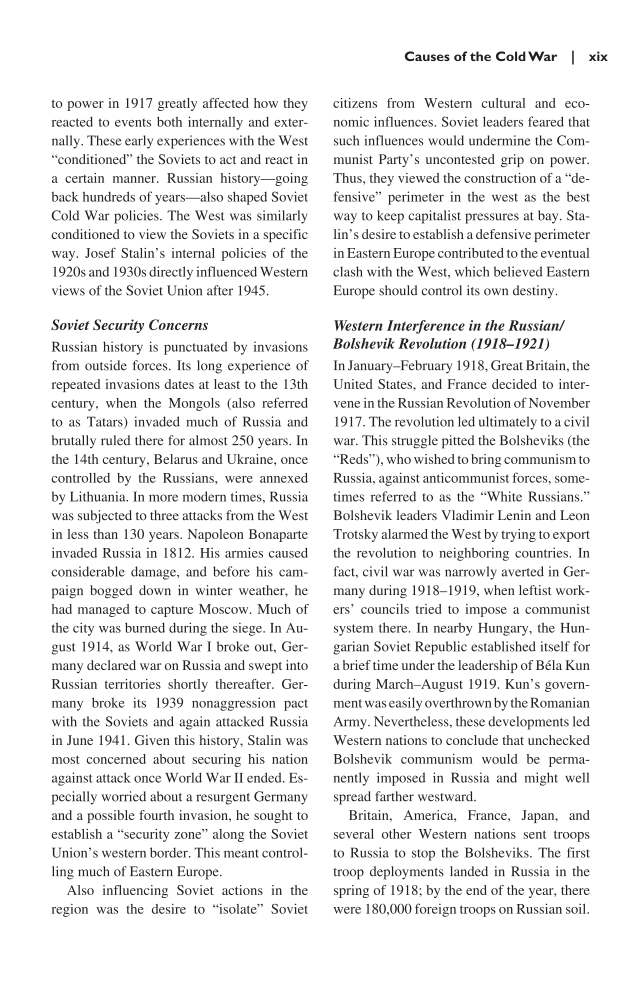Causes of the Cold War | xix to power in 1917 greatly affected how they reacted to events both internally and exter- nally. These early experiences with the West “conditioned” the Soviets to act and react in a certain manner. Russian history—going back hundreds of years—also shaped Soviet Cold War policies. The West was similarly conditioned to view the Soviets in a specific way. Josef Stalin’s internal policies of the 1920s and 1930s directly influenced Western views of the Soviet Union after 1945. Soviet Security Concerns Russian history is punctuated by invasions from outside forces. Its long experience of repeated invasions dates at least to the 13th century, when the Mongols (also referred to as Tatars) invaded much of Russia and brutally ruled there for almost 250 years. In the 14th century, Belarus and Ukraine, once controlled by the Russians, were annexed by Lithuania. In more modern times, Russia was subjected to three attacks from the West in less than 130 years. Napoleon Bonaparte invaded Russia in 1812. His armies caused considerable damage, and before his cam- paign bogged down in winter weather, he had managed to capture Moscow. Much of the city was burned during the siege. In Au- gust 1914, as World War I broke out, Ger- many declared war on Russia and swept into Russian territories shortly thereafter. Ger- many broke its 1939 nonaggression pact with the Soviets and again attacked Russia in June 1941. Given this history, Stalin was most concerned about securing his nation against attack once World War II ended. Es- pecially worried about a resurgent Germany and a possible fourth invasion, he sought to establish a “security zone” along the Soviet Union’s western border. This meant control- ling much of Eastern Europe. Also influencing Soviet actions in the region was the desire to “isolate” Soviet citizens from Western cultural and eco- nomic influences. Soviet leaders feared that such influences would undermine the Com- munist Party’s uncontested grip on power. Thus, they viewed the construction of a “de- fensive” perimeter in the west as the best way to keep capitalist pressures at bay. Sta- lin’s desire to establish a defensive perimeter in Eastern Europe contributed to the eventual clash with the West, which believed Eastern Europe should control its own destiny. Western Interference in the Russian/ Bolshevik Revolution (1918–1921) In January–February 1918, Great Britain, the United States, and France decided to inter- vene in the Russian Revolution of November 1917. The revolution led ultimately to a civil war. This struggle pitted the Bolsheviks (the “Reds”), who wished to bring communism to Russia, against anticommunist forces, some- times referred to as the “White Russians.” Bolshevik leaders Vladimir Lenin and Leon Trotsky alarmed the West by trying to export the revolution to neighboring countries. In fact, civil war was narrowly averted in Ger- many during 1918–1919, when leftist work- ers’ councils tried to impose a communist system there. In nearby Hungary, the Hun- garian Soviet Republic established itself for a brief time under the leadership of Béla Kun during March–August 1919. Kun’s govern- ment was easily overthrown by the Romanian Army. Nevertheless, these developments led Western nations to conclude that unchecked Bolshevik communism would be perma- nently imposed in Russia and might well spread farther westward. Britain, America, France, Japan, and several other Western nations sent troops to Russia to stop the Bolsheviks. The first troop deployments landed in Russia in the spring of 1918 by the end of the year, there were 180,000 foreign troops on Russian soil.
Document Details My Account Print multiple pages
Print
You have printed 0 times in the last 24 hours.
Your print count will reset on at .
You may print 0 more time(s) before then.
You may print a maximum of 0 pages at a time.




























































































































































































































































































































































































































































































